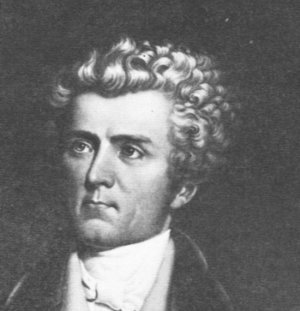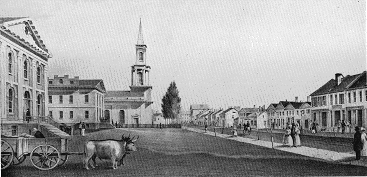
foreword | Historical Narratives | Resources | Links | Contact
FRANCIS BOND HEAD, PART 1
History is shaped more by human blunders than human wickedness.
Emblazoned upon the welcoming banners in the little town of Toronto were the words: Francis Bond Head, a Tried Reformer.
This came as news to Bond Head but then so did everything else about his new job as lieutenant governor of Upper Canada. The title and the task were bestowed upon him out of the blue. He had no idea whatsoever why he had been chosen to assume what he proudly and somewhat prophetically informed his son was "the Government of Canada."
 |
|
Sir Francis Bond Head |
Head candidly confessed to
In His Own Words"a gross ignorance of everything in any way related to the government of our colonies."
His predecessor, Sir John Colborne, had listened to the local oligarchy; Head listened to himself.
Francis Bond Head was born at the Hermitage in Higham Kent on January 1st, 1793 the youngest of six surviving children of James Roper Mendes Head and Frances Anne Burges. Francis had a lean face, a rigid mouth set between a beak nose, a prominent chin and a luxurious mop of curly hair of which he was quite vain. According a close family friend, Francis, like all five of his siblings, had "those frightful brown teeth." Head was also quick of mind, impetuous and self-willed.
James, Head's father, was a mean, hot-tempered spendthrift who squandered the family fortune when Francis was in his teens and for financial reasons was forced to flee to the continent. He spent the latter years of his life drifting about southern Europe and being a financial burden on Francis, who had the misfortune to be designated "the favourite son" of the arbitrary, irresponsible head of the Head household. Francis always feared he had inherited the worst of his father's failings and regularly fretted about his own actions and behavior.
Francis courted with couplets Julia Valenza Somerville and married her in 1816. They had four children the first of whom was Frank, a strong-willed and bright young man. Frank and his father were like brothers. In a letter to Frank dated 3rd December, 1835 Head had written
In His Own Words"You will think it rather a strange event when I tell you that I have come in to take leave of the King on assuming the Government of Canada." Head was at a loss to explain the appointment, candidly confessing to his son that "I know very little more than yourself."
It all began one night in November, 1835 when Head was awakened by a King's messenger with a letter from Lord Glenelg, Colonial Secretary, offering him the position. Glenelg informed Head that he had been considered for the appointment by the cabinet on the 19th of November
In His Own Words"as the man best fitted from his late conduct in Kent to reconcile the jarring interests in Upper Canada where both firmness and conciliatory conduct were equally required."
The 'late conduct' referred to Head's vigorous administration of the new poor law when he was assistant poor law commissioner and to his writings on the subject. His work and words had come to the attention of reformist members of the cabinet who felt Head was the conciliator Canada needed. Head's administration of the new poor law which replaced the dole with the workhouse had led to a riot in East Kent and to his use of the army to protect the poor law officers from the enraged paupers. That riot was to become a pecursor to a rebellion.
It is sometimes claimed that Bond Head was mistaken for his cousin, Edmund Walker Head, the brilliant classical scholar who later became lieutenant-governor of New Brunswick and subsequently governor-general of Canada. While this is a natural assumption it is incorrect, for to the amazement of many Prime Minister Melbourne's ministry really did intend to appoint Fancis Bond Head.
The reformist members of the cabinet were absolutely convinced Francis was the man for the job. Francis himself was less certain. Initially, he was dubious as to his qualifications for the job and uncertain about accepting the appointment. Before long, however, he dismissed all doubts and told his overjoyed Julia that whatever difficulties the job entailed they were not likely greater than those he had "conquered in Kent." In any case, he believed it was better
In His Own Words"to take the bull by the horns than to drag the cow by the tail."
Head rationalized that his job as poor law commissioner - of which he confessed he was becoming tired anyway - had been excellent training. It had given him insight into human nature, practice in exercising patience, and experience in public speaking, something which he believed would be invaluable when he ascended the throne "to make the King's speech."
His family was bursting with pride. His wife Julia told the children that
In Her Own Words"our government have looked around them for MERIT only and the choice has fallen upon your father." Head said the appointment would prove "conducive to the advancement of my family."
The selection of Head for this job bewildered almost everyone who heard of it except a close friend of the family who was a most interested observer of the fortunes of Upper Canada. Mrs. Elizabeth Posthuma Simcoe knew Head and was firmly convinced that he was the man for the job. Sir Francis, she declared, had the right ideas and he would soon put a stop to all the talk of reform in John Graves Simcoe's province.
Francis had been educated at the Royal Military Academy where in 1811 he was commissioned a lieutenant in the unfashionable Royal Engineers. It was his only alternative since it was the sole profession that required brains rather than money. After seeing service in Malta and Waterloo Head retired on half-pay in 1825 with the rank of major and took a job as a mining supervisor in South America. While there Head became a writer of sorts, his first book being about life on the pampas of Argentina. He was given the nickname "Galloping Head," for having twice ridden across South America between Buenos Aires and the Andes. These exploits and the books he wrote about them brought him some public notice. His writing revealed a talent for description, a love of nature, an interest in primitive peoples and a deep suspicion of all things un-English. It also revealed an erratic and impulsive person with a fondness for mock heroics and self-dramatization. Meanwhile Upper Canada was waiting.
 |
|
|
In 1831 Bond Head received a knighthood from King William IV, evidently for no other reason than having demonstrated to his sovereign the military usefulness of the lasso. Following a failed attempt to become head of the London's newly established Metropolitan police force, Head was appointed assistant poor law commissioner in 1834.
In spite of the pride and prestige the position as lieutenant-governor of Upper Canada would bring him, Head was not prepared simply to accept the job unconditionally. He was willing to go, he declared, but only as a baronet, the lowest of the lords. [* See Below] After a period of uncertainty, confirmation came that he would be promoted from a knight to a baronetcy.
With his new title intact Head prepared to depart for Canada to confront the unknown challenges he knew must lie ahead. Whatever they were he intended to tackle them alone, for he refused to subject Lady Head to the rigors of an ocean crossing until he was certain he could serve his sovereign. His commission warned him that the work would be difficult and critically important, but that he was thought to be up to the job. "You have been selected for this office at an era of more difficulty and importance than any which has hitherto occurred in the history of that part of Her Majesty's dominions. The expression of confidence in your discretion and ability which the choice implies would only be weakened by any more formal assuranced which I could convey to you."
Accompanied by his second oldest son, Henry, Francis and his party left Liverpool on Tuesday the 8th of December, 1835 and arrived in New York thirty-two days later. After "scrambling about town buying buffalo hides to keep out the cold," they set off on their ten-day, five hundred and fifty mile trip to Toronto. It was a harsh journey for the winter was the coldest in sixty years. For Henry the most spectacular spot in the whole junket was the Falls at Niagara, which he said seemed "finer and finer the longer you look at it." While Francis found the Falls impressive he was even more astounded at the size of Lake Ontario. In a letter to his wife he exclaimed that
In His Own Words"It so completely resembles the ocean that I can hardly persuade myself that it can be fresh water."
On Sunday, January 24th, 1836 Sir Francis Bond Head arrived in Toronto ready to begin his quixotic quest for fame in the service of his sovereign. Headstrong, heedless and utterly clueless about the colony and its government, he was prepared to meet and master the conflicting parties "on his terms." He had no political experience, had never voted in an election and had no interest whatsoever in his country's colonial policy. "Never in politics was there a greater blunder. He was a mere child among politicians. Surely it was a ministerial joke."
At this stage in its development Upper Canada needed the wisdom of the wisest of England's statesmen. Instead it got Head who was destined to make a bad situation worse. However, no one knew that when with open arms and hopeful hearts the colony's relieved reformers warmly welcomed to their tense little town a bewildered and somewhat frost-bitten Bond Head. See the conquering hero comes.
 |
|
King Street, Toronto, 1835 |
[*} In order of priority the Peers and Gentry of Britain are: Royal Dukes; Dukes; Marquesses; Earls; Viscounts; Barons; Knights. Knights are addressed as 'sir.' All others except dukes are called 'Lord.'
Copyright © 2013 Website Administrator